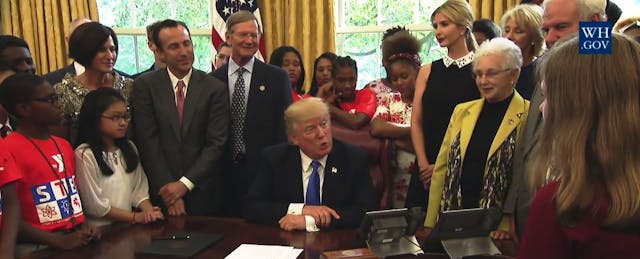“Does that sound like big bucks? What do you guys think?”
That’s what President Donald Trump asked a young student today in the Oval Office. Surrounded by children, educators, Ivanka Trump and Education Secretary Betsy DeVos, the President signed a presidential memorandum that expands K-12 computer science and STEM education in the United States with at least $200 million in annual grant funding.
In a memo directed to DeVos, President Trump acknowledged that STEM skills, particularly computer science, will be necessary for workers to attain jobs in the future. Yet, as he noted, many American schools don’t offer computer science courses, or teachers qualified to teach these subjects.
The memo affirms that computer science education should be one of the Department of Education’s priorities, and instructs DeVos to take that into account when awarding grants to schools. In addition, the Department of Education should make helping districts recruit and train teachers in STEM subjects—in particular, computer science—a priority.
According to the memo, “The Secretary of Education (Secretary) shall, consistent with law, establish the promotion of high-quality STEM education, including Computer Science in particular, as one of the priorities of the Department of Education. The Secretary shall take this priority into account, to the extent permitted by law, when awarding grant funds in fiscal year 2018 and in future years.”
There appears to be no new federal funding for this new initiative. Rather, the memo directs the Department of Education to devote at least $200 million in existing grant funds to support computer science education efforts. (Department officials did not respond, and neither did the White House).
In an interview with EdSurge, Hadi Partovi, CEO of Code.org, a nonprofit dedicated to expanding computer science education, says the Department of Education is being directed to focus existing grant funding on computer science programs.
Partovi does not seem concerned about how that stipulation may impact non-computer science programs at schools. “What it does is it focuses existing funds towards schools that teach CS,” he says, also adding that “it is going to create an incentive for schools to begin teaching computer science.” School districts that are applying to the Federal government for grants can get the same funding they were before, and “they’re now encouraged to include a proposal to expand access to computer science, with a focus on diversity.”
The memo also directs the education department to submit an annual report the Office of Management and Budget on “whether these actions succeeded in promoting and expanding access to high-quality STEM education, including Computer Science in particular, both generally and with respect to underserved populations.”
An Iranian-American, Partovi points out that he’s “probably the most unusual spokesperson to defend something done” by the Trump Administration, as his own community is being “directly targeted” by its policies. (Trump also announced a new travel ban on countries including Iran today.) He says he can distinguish and celebrate computer science education from other policies, contending that this initiative will help underprivileged children in American schools.
“It’s completely obvious to me that this policy will help American students, American children and, especially more than anything else, American children in communities, backgrounds and races that feel most targeted from some of the things that you may disagree with from this administration,” Partovi adds.
On Tuesday, Ivanka Trump, who is credited with leading this initiative, will join business leaders in Detroit to share more details about the tech sector’s support. Salesforce is one of the confirmed companies.
Trump’s announcement adds yet another twist in his relationship with the tech industry, which has largely condemned his position and policies surrounding immigration and citizenship.
Gerard Robinson, a resident fellow at the American Enterprise Institute who served as an education advisor on Trump’s transition team, says even though most tech companies don’t agree with the Trump administration’s policies, in politics, business people will still seek areas where they can agree.
“If Amazon and the tech companies believe this is important because this will help bolster the number of people available for them to hire, then they’ll see that as a good thing,” Robinson explains. “So for this, they'll work together. On other issues, they won’t.”


